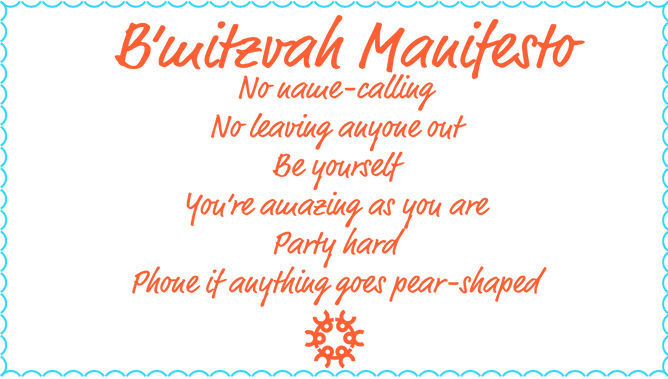What is the deal with becks?
It's not a term of endearment, that's for sure. Whenever I hear the word, I ask what people mean. (If you've said it to me, you know I've asked!) Here are some word-for-word definitions I hear over and over again:
"Oh, you know. All they care about is what they look like."
"The rich lot."
"It's a clique. You've got to fit in or you don't belong."
"They treat life like a popularity contest."
"Make up."
"I don't know. I mean I know what a beck is. But I can't explain it."
They've certainly been around for at least 30 years.
So what about nebs?
Again, it's not a term of endearment. Here are the commonest definitions I hear:
"Sad."
"Erm, sad."
"Stupid."
"It means you've got no friends."
"I don't know. Sad?"
Seems it's easier to articulate the definition of a beck than it is a neb. Some kids certainly don't seem to hold back on name-calling either way. Mind you, neither do some adults.
Either way, any kind of name-calling ain't exactly helpful for the party spirit. Wouldn't life just be easier... actually nicer... without name-calling of any kind?
Either way, any kind of name-calling ain't exactly helpful for the party spirit. Wouldn't life just be easier... actually nicer... without name-calling of any kind?
What can we do about it, though?
First, my thoughts on why these labels exist: When we label each other, we're setting ourselves - actually our peer group - apart. In my view, it's usually to elevate ourselves in relation to others or to describe a pattern of behaviour that makes us feel uncomfortable or vulnerable.
In truth, one-on-one, isn't everyone lovely? Come on! It's true, isn't it? Who could you not get along with when it's just the two of you together? OK, maybe there's one person. But generally?
Usually, negative behaviours happen in group situations. And parties with young people are particularly susceptible breeding grounds for separation behaviours.
Why?
For one, it's because parties often throw people together who aren't used to being together.
For another, it's because unsupervised kids can find it difficult to moderate their own behaviours when they're under pressure.
And for yet another, it's because those common teenage feels of angst and uncertainty can make anyone feel defensive and want to fit in.
So here are some tips for mitigating some of the negative affects on parties of the whole becks vs nebs battle.
In truth, one-on-one, isn't everyone lovely? Come on! It's true, isn't it? Who could you not get along with when it's just the two of you together? OK, maybe there's one person. But generally?
Usually, negative behaviours happen in group situations. And parties with young people are particularly susceptible breeding grounds for separation behaviours.
Why?
For one, it's because parties often throw people together who aren't used to being together.
For another, it's because unsupervised kids can find it difficult to moderate their own behaviours when they're under pressure.
And for yet another, it's because those common teenage feels of angst and uncertainty can make anyone feel defensive and want to fit in.
So here are some tips for mitigating some of the negative affects on parties of the whole becks vs nebs battle.
1. Reinforce our expectations of our own children's behaviour
As they're leaving or as we're dropping them off, it's important give a reminder of our expectations:
Better still, at the end of the evening, by asking our kids if there'd been any name-calling or leaving people out, we'll be reinforcing how important these behaviours are to us.
"No name-calling of any kind."
"No leaving anyone out."
2. Encourage self expression
What th...?
As I said earlier, separation behaviours often come from feelings of uncertainty and vulnerability. When you're chasing a particular image or a popular crowd you're effectively trying to mould yourself to fit in. Equally, if you think of yourself as not part of the "in crowd", you're effectively positioning yourself as not fitting in. That's fine if it's a comfortable fit (or misfit).
But if it's in any way uncomfortable then you're just going to feel more vulnerable, because you can be expelled at any time from any group. Here are a couple of messages that positively reinforce self worth:
As I said earlier, separation behaviours often come from feelings of uncertainty and vulnerability. When you're chasing a particular image or a popular crowd you're effectively trying to mould yourself to fit in. Equally, if you think of yourself as not part of the "in crowd", you're effectively positioning yourself as not fitting in. That's fine if it's a comfortable fit (or misfit).
But if it's in any way uncomfortable then you're just going to feel more vulnerable, because you can be expelled at any time from any group. Here are a couple of messages that positively reinforce self worth:
"Be yourself!"
"You're amazing as you are!"
There's no more satisfying and enriching experience at a party then sharing the love. It's why, if you've ever been to a party where you've left your inhibitions at the door and let your hair down on the dance floor you'll know exactly what I mean. Loveable parties are blind to cliques like becks or nebs.3. Bolster inner strength
Anyone who knows me knows I'm already pretty confident in myself. That's not to say I'm happy with everything! But I do know two things: Nothing that bad's going to happen to me just for having a good time. And there are people in my life who'll help if something gets me down.
I never even spare a thought as to what group I'm part of. Beck, Neb, or anything else. I have no idea! Two simple instructions that can help at a party are...
Just like instructing a child to work hard at school (because schools are places where they're supposed to work), instructing a child to party hard at a party makes it clear what a party's all about. And being able to phone a parent (by borrowing a trusted adult's phone if you agreed with what we said about kids and phones) gives them a safety net if they can't deal with a situation themselves.
I never even spare a thought as to what group I'm part of. Beck, Neb, or anything else. I have no idea! Two simple instructions that can help at a party are...
"Party hard!"
"Phone if things go utterly pear-shaped."
Just like instructing a child to work hard at school (because schools are places where they're supposed to work), instructing a child to party hard at a party makes it clear what a party's all about. And being able to phone a parent (by borrowing a trusted adult's phone if you agreed with what we said about kids and phones) gives them a safety net if they can't deal with a situation themselves.
4. Ask your entertainers what they can do to help
Practically every client meeting we have includes a heartfelt discussion about dealing with some kind of negative behaviour. "What do we do about becks?" "What do we do about kids who won't join in?"
There's no magic fix-all. However, an attentive DJ or band leader who understands the dynamics of crowds and can empathise with negative behaviours will be more likely to have some tricks up their sleeves.
Listen out for ideas that bring kids together, that cheer-lead for individuality and self expression, and that can spot and bolster any kid who looks like they're being left out.
There's no magic fix-all. However, an attentive DJ or band leader who understands the dynamics of crowds and can empathise with negative behaviours will be more likely to have some tricks up their sleeves.
Listen out for ideas that bring kids together, that cheer-lead for individuality and self expression, and that can spot and bolster any kid who looks like they're being left out.
Here's our first-take at a b'mitzvah manifesto.
Some obvious rules-of-thumb for everyone.
What would you add or take away?




